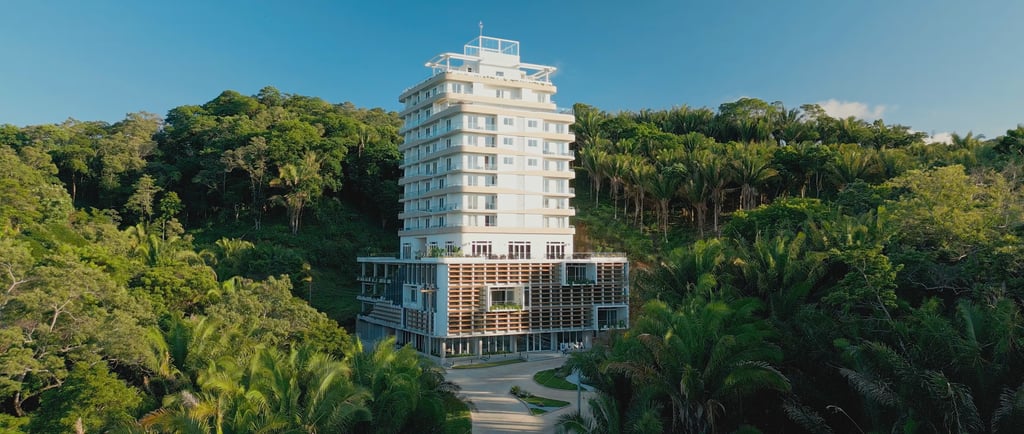The City Built on Voluntaryism
Examination of the Libertarian start-up city of Próspera
PRIVATIZATION
Daniel Donnelly
6/1/20257 min read


Nestled amidst a jungle canopy, rises the community of Próspera, a Libertarian “start-up city” under development in Honduras. Próspera was envisioned as a model city of fully privatized services, in which every resident-owner exercises a degree of suffrage in its operation. Overall, it is a bold experiment in anarcho-capitalism, which is why those partial to traditional government are rooting for its imminent failure.
The experiment of Próspera is itself founded upon another experiment, that of a charter city. This concept was proposed in 2009 by Nobel laureate economist Paul Romer. He theorized that prosperity was the product of experimentation in systems of governance. He urged the establishment of cities to act as jurisdictional laboratories, play-testing systems of governance to determine which produced the most prosperity for the greater number of people within the shortest time span. Dr. Romer therefore suggested that foreign governments from developed nations establish municipalities in the developing world. These “charter cities” would remain under the developed nations’ civil jurisdiction, and by informally competing with one another to attract business and inhabitants, the best practices would rise to the top.
Honduras decided to put Dr. Romer’s theories into practice in 2013 by promulgation of what was to become “zones of employment and economic development,” the acronym of which is ZEDE in Spanish. These areas remained subject to Honduran criminal and constitutional law, but first-world nations would administer them according to their own civil codes. These charter cities, constructed at the first-world nations’ expense, would test the variable of differing legal systems in the real world against the constant of the same country – namely Honduras – in the hopes that the general living standard could be improved in a country with a gross national income per capita of just $2900 annually.
Not long afterwards, a group of investors approached the Honduran government to propose a variation to Dr. Romer’s model. Instead of a foreign government administering a ZEDE’s charter city, this city would be administered by a private board mostly elected by the city’s resident-owners. Honduras’ government accepted this deal, and in 2017 Próspera was founded on the northern shore of the island of Roatán in the Caribbean, next to the fishing village of Crawfish Rock. Within the scope of two years, Próspera invested $2 million into acquiring realty in the village.
As of today, Próspera owns roughly 3% of Roatán’s 32 square miles (83 km²), across discontinuous parcels. It also acquired a parcel on Honduras’ mainland, by the port of La Ceiba, at which Próspera has established a manufactory to produce fixtures required for the hub in Roatán. In Roatán, Próspera’s realty includes conventional beachside villas, futuristic villas designed by Zaha Hadid (the architectural firm commissioned for distinctive municipal planning on the Libertarian micronation of Liberland), high-rise apartments in three multi-unit towers, and “low impact” pods like trailers which are stationed on the jungle floor, seemingly intended for “serial entrepreneurs” who do not mind the banausic accommodations. Residency fees cover common and privatized services on offer in Próspera, and Honduran citizens get a discount of 80% on such fees. In fulfillment to its purpose of raising Honduras’ living standard, Próspera’s charter requires that 90% of its workforce be Honduran, and Próspera must pay them at least 25% over the national minimum wage, though most jobs in Próspera pay them significantly more. There are even plans to pilot a charter city of this sort in Africa.
Exercising its autonomy as a ZEDE, Próspera has registered over 300 businesses. Continuing the experimentation with systems of governance, every entity which incorporates in Próspera chooses which corporate law to follow. An entity can opt for Honduran law, U.S. common law, Singapore law, or the jurisprudence which governs any of the now 38 countries belonging to the Organisation for Economic Co-operation and Development (OECD). An incorporating entity can mix and match regulations or even craft its own. The drawback to such freedom is that every incorporator is required to insure his business against externalities, and such insurance becomes costlier depending on the pre-selected governing code’s novelty. If conflicts arise, the Próspera Arbitration Center, staffed by highly credentialed jurists, can hear the case. Yet litigants may always resort to Honduran courts if Honduran law can properly adjudicate the dispute.
This unique business milieu has attracted pioneers in the fields of cryptocurrency, biomedicine, finance, hospitality, education, retail, and technology. There are start-ups for patented gene therapy, and engineers developing consumer-oriented robotics. Though these endeavors’ proponents may come from developed nations, Próspera in Honduras offers an environment more conducive to success in these fields than the ossified overregulation prevalent in places like the USA and Europe.
Próspera is steadily attracting people from all over the world, of diverse interests, united in time and place by a shared belief in voluntary exchanges. This is the ethic that by serving your fellow man in commerce, the lots of both buyer and seller are improved. Prósperans seek no hand-outs nor bail-outs, realizing that they alone are responsible for the consequences of any risks they take. These are proactive people unwilling to be bottlenecked by government unless such gatekeeping adds affirmative value to their lives.
This entrepreneurial spirit initially caused friction with Próspera’s neighbors. In September 2019, Crawfish Rock’s cistern failed, leaving the townsfolk with no water (¶ 42). Próspera of course could have completely ignored its neighbors’ plight, leaving apathy to write scandalous headlines. Instead, Próspera agreed provisionally to supply the town from its own wells. It took Crawfish Rock over a year to repair its cistern, so Próspera had begun to bill the neighbors for the supplied water. The neighbors complained that it was unjust for Próspera to bill them. But imagine one day lending a cup of sugar to a neighbor, and for a year thereafter he’s hanging on your doorbell every time he wants his coffee sweetened!
Every Western journalist covering Próspera courts these local critics’ accounts, so familiar tropes emerge. Journalists style the relationship between Próspera and its local critics as a David-versus-Goliath narrative. Wired (¶ 24) even casts Próspera’s local critics as the tale’s “noble savages” (my editorialization) blithely living in harmony with the untamed land (they’re actually quite savvy as their frequent media appearances demonstrate). The reporting frames the scenario like James Cameron’s anti-colonialist epic of Avatar, leaving readers in no doubt about who plays the villain. Critical examination of the reporting, however, leads to a very different conclusion.
Honduras’ Congress authorized a total of five ZEDEs nationwide, of which Próspera was one. Officially, ZEDEs were imbued with the power of eminent domain, which engendered national outcry ultimately leading to ZEDEs’ abolishment in 2024. Próspera, however, explicitly renounced this power in its original charter and bylaws, thereby prohibiting itself from coercively acquiring land. Yet Western journalism is quick to record Próspera’s local critics’ expressions of fear (time stamp 14:10) about Próspera seizing their land when Próspera has pointedly divested itself of any ability to do so.
Some Western coverage of Próspera’s local critics even addresses murkier apprehensions. We are told that these critics fear for their “way of life” in Crawfish Rock, as if Próspera’s Bitcoin miners will suddenly drop everything to compete with their neighbors in hand-pressing coconut oil (time stamp 09:10). Perdomo et al (Criterio, fifth image’s caption) tell us that some locals “never consented to” Próspera’s investments in a nearby elementary school, due to “concerns that foreigners would permanently settle there.” Such sentiment, if expressed by Americans, would undoubtedly be labelled xenophobia, but that’s beside the point. In this instance, the school evidently consented to Próspera’s support, as the school was the party to derive the direct benefit. Can you imagine needing money and someone you trust is willing and able to give it to you, but your neighbors try to nix the deal?
Nearly every Western news outlet covering Próspera also painstakingly informs us about U.S. business interests’ coup d’état instigated against Honduras 110 years ago… as if anyone associated with Próspera could or would have anything to do with that. If nothing else, this reveals a misunderstanding of the Libertarianism on which Próspera is premised; Próspera exists as a model for voluntary exchanges, diametrically opposed to the coercion of coups and government. This is the reason for another strain of criticism against Próspera, mainly coming from those partial to traditional government.
Criterio tells us that Crawfish Rock’s mayor laments that Próspera is constructing without paying for municipal building permits, from which Próspera is exempt as a ZEDE. The only conceivable, affirmative value to a building permit is the assurance of safe construction, but think about that for a moment. Próspera’s reputation and business model are on the line for everything it constructs, which means that Próspera and its insurers have a much stronger interest in safe construction than the local township.
As mentioned before, Honduras abolished ZEDEs by judicial decision in September 2024. In November 2021, Honduras elected Xiomara Castro (no kinship to Fidel and Raúl) as President. She had campaigned hard against the ZEDEs, including Próspera. President Castro regularly inveighs against the ZEDEs for paying considerably less taxes, and she wants to rescind the arrangement into which ZEDEs like Próspera are grandfathered for a period of fifty years. This is the arrangement which has attracted the investment of billions into Honduras through the ZEDEs, when otherwise the capital would have gone to stabler jurisdictions. President Castro is poignantly familiar with Honduras’ recent instability, given that her own husband, Manual Zelaya, served as Honduras’ president from 2006 until he was ousted and exiled in a coup in 2009, and her immediate predecessor, Juan Orlando Hernández (2014-2022) was convicted and incarcerated for drug trafficking, joining there his own immediate predecessor, Porfirio Loba Sosa (2010-2014), temporarily imprisoned for accepting bribes from drug traffickers.
Próspera is now locked into a lawsuit with the Honduran government about the ZEDEs’ rescission under the Convention on the Settlement of Investment Disputes. The government stands to lose a hefty sum if Próspera prevails in court. More’s the pity since Próspera has no interest in gaining money via the zero-sum game of litigation. Instead, Próspera hopes to showcase to the world that wealth can be generated in service to our fellow man through voluntary exchanges.
